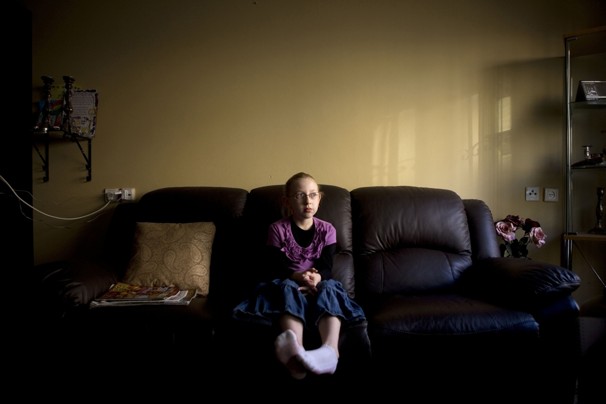UPDATES
Naama brings into focus the debate about gender and religion in Israel
January 5, 2012 | Sharyn Mittelman

The issue of public gender discrimination and harassment in Israel has received significant media coverage both in Israel and abroad.
It began with recent controversies over women singing in a ceremony for the Israeli army, which was boycotted by religious soldiers, and the informal gender segregation on some buses in ultra-Orthodox (haredi) areas. (See a previous blog post on these issues.)
It has now been compounded by an interview with an eight year old Orthodox girl from Beit Shemesh, Naama Margolis, who was visibly shaken when she talked about her fear of walking to school due to the harassment she has been subjected to by some ultra-Orthodox Jews who have insulted and harrassed her for being dressed ‘immodestly’.
Naama said: “When I walk to school in the morning, I used to get a tummy ache because I was so scared that they were going to stand and start yelling and spitting”.
The harassment that Naama experienced has rightfully been strongly condemned by both Israeli political and religious leaders.
Prime Minister Binyamin Netanyahu declared:
“In a Western, liberal democracy, the public realm is open and safe for all, men and women both, and neither harassment nor discrimination has any place there.”
While Naama’s story has generated important discussion in Israel about the extent to which secular law should accommodate religious sensibilities, something is often missed in the debate. In this incident, spitting and swearing at an eight year old girl is not Jewish law, it is an affront to it.
The majority of Orthodox Jews are not party to this behaviour, yet recent incidents are giving their communities a bad name. However, increasingly Orthodox and ultra-Orthodox groups including Chief Rabbis are speaking out against this behaviour.
The Chief Rabbi of Israel’s armed forces, Brigadier Rafi Peretz, said that,
“There is no room for radical and erroneous interpretation of halacha (Jewish law), which serves as an excuse for discrimination against women. The Jewish spirit, our ancestors’ legacy, demands respect for women.”
Rabbi Moshe Lichtenstein, a dean of Yeshivat Hesder Har Etzion, took on the issue of listening to women sing at IDF ceremonies and conducted a detailed halachic analysis showing that there were well-founded, lenient opinions in halacha (Jewish religious law) which sanction women appearing and singing in public – that could and should be relied upon in the army and other public frameworks, including in-house religious Zionist gatherings:
“Women should have significant personal and religious self-expression, including non-sexual singing; and for those who want to, it is perfectly legitimate to rely upon the lenient halachic opinions in this regard…When the important values of national service and national unity are added into the mix of halachic considerations, it is clear that to provoke unrest and enmity over the commonplace singing of women in army ceremonies, and to disconnect oneself from the public in this way – is a mistake. Fanaticism on this issue sets off alarm bells in every sinew of my body,”.
Rabbi Ovadia Yosef spoke out against overdone gender separation and against ultra-Orthodox extremist actions like the wearing of Nazi yellow stars to protest.
The Ashkenazi (European descended) Chief Rabbi Yona Metzger criticised the segregation of men and women on public transportation and said that the haredi community does not have the right to impose its practices on public bus lines. Rabbi Metzger said:
“If we want there to be segregation, it would be legitimate for us to establish our own transportation company” and that “We [the ultra-Orthodox] don’t have the authority to force our ideas on others…This country does not belong to the haredi community.”
Chief Rabbi Shlomo Amar, who represents Sephardic Jews of Mideast descent, said: “A person can subject himself to a stricter code, but not others.”
In another development, a new group of Orthodox rabbis is being formed under the tentative name of “Beit Hillel: Attentive Rabbinic Leadership” for the purpose of expressing forthright views on current affairs from a “Zionist, modern, democratic and tolerant” perspective.
It is also important to remember that incidents of gender discrimination and harassment in Israel are few and isolated and do not reflect general Israeli society which has a strong record of respecting women’s equal rights. These incidents generally occur in small isolated communities that adhere to ultra-Orthodox tradition.
It is worth noting that the particular small ultra-Orthodox sect implicated in Naama Margolis’ “Sicarrii”, are anti-Zionist, meaning that, for religious reasons, members of this sect do not acknowledge the legitimacy of the state of Israel, vote, serve in public office, or have anything more than absolutely necessary to do with secular Israel, or even other Orthodox Israelis. They are hardly typical even of the ultra-Orthodox community.
An excellent discussion of the complexities of what occurred at Beit Shemesh, why Naama was targeted, and the misunderstandings in the debate about her situation comes from an opinion piece by Orthodox Beit Shemesh resident Natan Slifin, who noted:
“Everyone agrees that the Battle of Beit Shemesh – my hometown for over a decade – is about a group of hostile, hateful people trying to impose their ideology on a group of nice, normal Jews. But whereas the secular, national-religious and moderate haredim (ultra-Orthodox) think that the group of hostile, hateful people trying to impose their ideology on others are the haredi extremists, mainstream haredim think that the group of hostile, hateful people trying to impose their ideology on others are the secular….
Many secular Jews possess the absurd belief that all haredim, or even all religious Jews, are of the same mindset as the extremists. Former Meretz Party chairman Yossi Sarid declared that Judaism itself halachically mandates such behavior (!), and that all religious parties should be disqualified from the Knesset.
The widespread talk against religious Jews is no less offensive than the curses heaped by haredi extremists upon others. This also has the effect of encouraging the wider haredi world to adopt a siege mentality and prevents them from acknowledging any wrongdoing in their own camp – which in turn lends credence to the secular charge that haredim are indeed all of the same mindset. Thus, the ultra-secular and the ultra-Orthodox are locked into a vicious cycle which brings out the worst in each….
The events in Beit Shemesh had little, if anything, to do with the oppression of women. The haredi extremists did not object to Banot Orot because it was a girl’s school; they objected to it because it was national-religious. And those who linked the Beit Shemesh extremists to the soldiers who walked out of a ceremony in which women sang got it entirely wrong. Walking out may well have been unwise and even unnecessary, but in that case, the soldiers did not impose their mores upon others; if anything, secular mores were being insensitively and unwisely imposed upon them….”
Another insightful analysis comes from Yair Ettinger, who suggests that the ultra-Orthodox extremists such as the Sicarii are reacting to the trend of goriwng reform in the Ultra Orthodox communities whereby haredi are joining the army and entering academia and professions. He writes:
“Pappenheim thinks that in the ultra-Orthodox’s clash with outsiders, the extremists on both sides are failing to see the powerful processes underway in the ultra-Orthodox mainstream: The ultra-Orthodox are irreversibly opening up, he believes.‘…Israel’s ultra-Orthodox public has begun to understand that it needs to take its fate into its hands. There are thousands of ultra-Orthodox in the army, in academia, in the free professions. Are they telling us we’re in a religious war? On the contrary. The religious public is heading toward something great, and the rabbis’ attempts to stop this are like the rooster running in circles after being beheaded.’ The Sicarii are acting out of frustration, not ideology, he says. ‘They see society around them progressing and are frustrated. They do not really think; they just act violently for the sake of causing action and chaos.'”
In any case, Naama’s story and others like it are a reminder that more work needs to be done to prevent public gender discrimination. While ultra-Orthodox communities have the right to practice their religious beliefs they cannot impose their beliefs in the public space, such as public buses.
There are new measures being considered by the Israeli government to prevent public gender discrimination in Israel. For example, Nachman Shai submitted to the Knesset a bill proposal that would define gender segregation as a criminal act punishable with a prison sentence. The bill would provide for a sentence of three years for anyone charged with “publicizing, inciting, preaching or encouraging gender segregation in the public sphere,” and violations of the law committed in order to facilitate gender segregation or hostility towards the public because of gender affiliation would carry either a double penalty for the crime or a ten year prison sentence.
In addition, new guidelines for public ceremonies, a hotline for women hassled on so-called gender-segregated buses and penalisation for religious authorities if women are excluded from burials are some of the new measures the government committed to adopt during a special meeting of the Ministerial Committee on the Status of Women.
Therefore, while these incidents of public discrimination are shocking, they do not reflect general Israeli society and action has been taken to ensure that gender discrimination is prevented and, when it occurs, punished. As in many other recent issue of public controversy concerning Israeli domestic issues, Israeli democracy has functioned very effectively.
Thankfully this debate is also moving ultra-Orthodox groups to unite with political officials to declare the harassment experienced by Naama as unacceptable – as it against both Israeli and Jewish law.
Sharyn Mittelman
Tags: Israel





